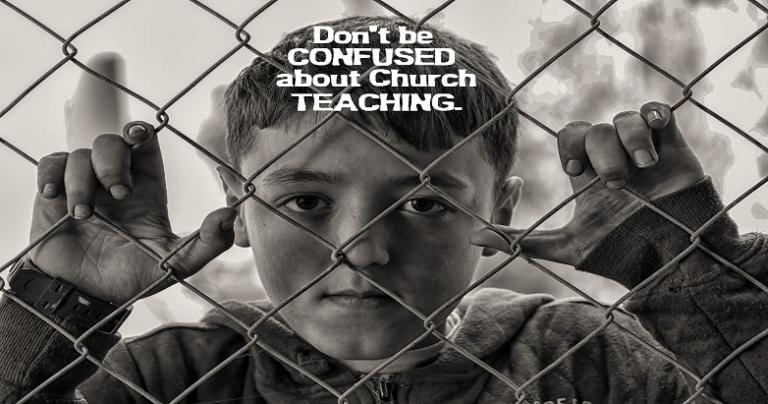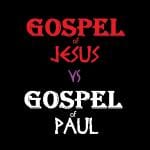
Do you really want to follow Church Teaching and be genuinely pro-life?
Don’t be confused, fellow Catholics. If you are Catholic, you should live the Catholic life. That’s what our right-wing friends tell us. “You can’t be Catholic and go against Church Teaching.” Okay. But don’t be confused about what that means.
Here’s a video all about that.
Don’t Be Confused!
I owe much love and gratitude to Professor Sixto Garcia for this piece. He heroically taught the truth for over three decades at a regional seminary. Stormtroopers of “orthodoxy” could not silence his fire, but they tried!
Let’s dive deep into what it means to be good Catholics and consistently pro-life. Here are some meaningful quotes.
Don’t Be Confused About AMBROSE OF MILAN (d. 397)—
“You, the rich, how far will you push your frenzied greed? …
When giving to the poor, you are not giving him what is yours; instead, you are paying him back what is his. Indeed, what is common to all, and has been given to all to make use of, you have usurped for yourself alone. The earth belongs to all, and not only to the rich …
You are paying him back, therefore, your debt; you are not giving gratuitously what you do not owe.”
“Sermon on Naboth”
Don’t Be Confused About BASIL OF CAESAREA (d. 379)—
“What are then, tell me, the goods that you claim to possess? To what extent are they an essential part of your life? The problem with the rich is that they are like the man who takes a seat in a theatre and then denies entrance to others, usurping thereby, and appropriating for himself what is meant for common use.
“The rich regard as their own those goods that they have acquired before the others, for the sole reason of having been the first to acquire them. If each one of us took only what is necessary for his sustenance, leaving what is superfluous for the indigent, there would be no distinction of rich and poor.
“You have become an exploiter by appropriating for yourself the goods that you were called to administer. The bread that you keep for yourself belongs to the hungry; to the naked belong the clothes that you hoard in your closet; to the barefooted belongs the shoes that is gathering moth in your home; the indigent have a right to the money you hide in your coffers …”
From the homily
“On avarice, ‘on the text of Luke: ‘Destroy this house and I will build a large one’”
Don’t Be Confused About JEROME (d. 420)—
“Every rich person is either a thief or the heir of a thief.”
“In Hieremiam” II. V. 2
Or JOHN CHRYSOSTOM (ca. 349-407):
“Not to share one’s wealth with the poor is to steal from them and to take away their livelihood.
It is not our own good, which we hold, but theirs.”
“On Lazarus and the Rich Man,” II, 6.
Don’t Be Confused About THOMAS AQUINAS (d. 1274)—
St. Thomas claims that everything in nature, all of the components of creation, except for persons, are resources. These resources can be used appropriately for the good of the person (Summa Theologiæ II-II q. 66 a. 1c and ad 3).
For what purpose is private property? St. Thomas answers that private property is for the COMMON GOOD. Therefore, society can and should legitimately appropriate or “own” of “what from the outset was common.” In other words, we ought to legitimately take and steward from what was available to all. But why? This is so, says St. Thomas, because the owner who has appropriated these goods can “share them with other people (aliis communicat)” (ST II-II a. 2 obj. 2 and ad 2).
Why then private property? St. Thomas finds the ultimate justification for this human right is our responsibility to “general” justice. Therefore, private owners are to be donors, benefiting the common good with advantages (cf. ST II-II q. 66 a. 2c).
Whenever ownership occurs, and thus, appropriation of resources happens, this must always be subordinated to justice for the common good (ST II-II q. 66 a. 2c). The final use of resources must remain common or unappropriated. It follows then that nothing belongs naturally to one individual or group instead of another. Ultimately, according to St. Thomas, everyone can fairly use natural resources by natural right.
Don’t Be Confused About the Theological Consequences.
So, according to St. Thomas Aquinas, if you own something, you are holding it in common (ST II-II q. 66 a. 2c). But never forget, imprimis debemus distinguere—we must make distinctions. So St. Thomas carefully does here, distinguishing between:
- Resources needed to survive (both individuals and their families).
- Resources required to fulfill social responsibilities, these being:
- Education and support of the family.
- Maintaining employment.
- Helping your children in general.
- Paying debts.
- Surplus resources (superflua), remaining after situations (a) and (b) are met.
What moral norms follow? Since everything you own is “held as common” for justice to anyone needing it to survive, what happens should you withhold your surplus to someone in need? St. Thomas, following the Fathers, says you have stolen from what is justly theirs. This is why Jerome says, “Every rich person is either a thief or the heir of a thief.” Like Jesus (Luke 12:13-21), Jerome talks about greedy people with surplus refusing to be just patrons.
Owners hold what they own in common. This means they must use them justly. This means to benefit the poor.
What About Life-Threatening Needs?
And what happens if someone is in desperate need? In that case, St. Thomas says, justice demands that nothing belongs to anyone in particular, for “all resources become common resources.”
Consequently, people facing life-threatening crises are morally justified to take whatever they need to survive. Ultimately, their right to life (sound familiar?) overrides your lesser right to private property (IV Sent. d. 15 q. 2 a. 1 sol. 4c; cf. also II-II q. 32 a. 7 ad 3; q. 187 a. 4c).
Despite all the passionate bluster and cheerleading, one can muster, U.S. Catholics will never be really pro-life without living by this truth.
Don’t Be Confused About Surplus
So St. Thomas follows a golden chain through the Fathers linking right back to Galilean nothing-person Jesus and his peasant view of the Limited Good. Therefore, he sees all excess (omnia superflua) of goods are “held in common” (ST II-II q. 87 a. 1 ad 4).
But we ought to distinguish needs from wants, real goods from apparent goods, indeed. So what about situations where there is no dire necessity or life-threatening problem? Even then, St. Thomas says resources held in excess (superflua) should be available to “the poor.”
But why? It is for the poor to satisfy social responsibilities such as education and support of their family, maintaining employment, helping their children, and paying their debts. Poverty deprives them of these capabilities. Owners must be donors, therefore.
Refusal to do this would be evil, properly defined as the privation of a due good. We are talking about justice, people, not charity. Charity happens when you hurt in giving. Consult a crucifix.
Don’t Be Confused About Prudence & the Role of Government
And how are we to determine how great the need is when someone poor asks for what is justly held in common? St. Thomas answers discernment comes by way of the charioteer of the virtues, practical reason (phronesis, prudentia) (Quodlib. VI q. 7 un. c and ad. I).
What role does the Government play in all this? Some U.S. Catholics may balk that it isn’t charity when you are forced to do something. They can relax—again, we aren’t talking about charity, but rather justice.
Rulers are responsible for providing anything otherwise lacking that is necessary to sustain human life, says Thomas Aquinas (ST II-II q. 77 a. 4c). So rulers and laws should allow the just distribution of goods. In that way, their use remains common (ST I-II q. 104 a. 1 ad 1; q. 105 a. 2c and ad 3).
Any excess (superflua) in my possession truly belongs to others, says St. Thomas. Therefore, should I withhold the excess from anyone who needs it, I am inescapably stealing from them. It is because, under their need, these goods really belong to them, not me (ST II-II q. 67 a. 7c).
Don’t Be Confused About Paul VI, JPII, and Benedict XVI
“If certain landed estates impede the general prosperity because they are extensive, unused, or poorly used, or because they bring hardship to peoples or are detrimental to the interest of the country, the common good sometimes demand their expropriation” (Paul VI, “Populorum Progressio,” 24).
“It is necessary to state once more the characteristics principle of Christian social doctrine: the goods of this world are originally meant for all … Private Property, in fact, is under a social mortgage, which means that it has an intrinsically social function, based upon and justified precisely by the principle of the universal destination of goods” (John Paul II, “Sollicitudo Rei Socialis,” 42).
“While the poor of the world continue knocking on the doors of the rich, the world of affluence runs the risk of no longer hearing those knocks, on account of a conscience that can no longer distinguish what is human” (Benedict XVI, “Caritas in Veritate,” 75).
Deep Wisdom!
And here is pastoral wisdom from a source more brilliant and wise than all three of these popes put together—
“I do not believe that just because you are opposed to abortion, that that makes you pro-life. In fact, I think in many cases, your morality is deeply lacking if all you want is a child born but not a child fed, a child educated, a child housed. And why would I think that you don’t? Because you don’t want any tax money to go there. That’s not pro-life. That’s pro-birth. We need a much broader conversation on what the morality of pro-life is.” (Sr. Joan Chittister, from a 2004 interview with Bill Moyers)
Don’t Be Confused About the Gospel
All of this comes from Christ and goes to Christ. Understand it showcases we are lightyears away from being truly pro-life. Superfluous goods don’t belong to you. And should you give them to those who need, you work under the obligation of justice, not charity.
Joe Rightwing Catholic says, “F— that! I work hard for my wealth. It’s MINE! I do with it whatever I like!”
Okay. Just understand that you aren’t pro-life. It doesn’t matter how many abortion clinics at which you protest. Or how many “Choose Life!” bumper stickers you decorate your car with. Or how many January trips to Washington D.C. you take. Your paradigm and attitude reflect the darkness of the antichrist. You don’t know the Gospel. Repent.
Better attitude: How fortunate I am to have this extra. What ought I to do with it, prudently? Who needs it? How may I give it in the best way while not hurting my obligation to those nearest me?
Faith & Reason
Don’t get me wrong. Everyone has the natural right to live, enjoying modest comforts. Likewise, we have the right to plan, within reason, for the tomorrow coming for ourselves and our dependents. Nevertheless, we are obligated to considerately and justly use our surplus wealth to address the poor’s basic human needs.
We’ll talk more about this later.












